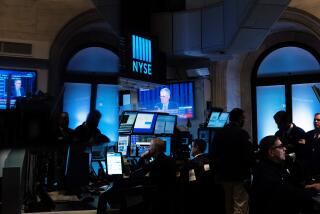Market Watch : New Competition Makes It Harder to Find the Best Broker : Investing: Extra diligence is needed to find an adviser who is more interested in fine-tuning your portfolio than making a sale.
- Share via
The big risk in looking for a broker in today’s lean, mean financial markets is not in signing on with a brokerage that goes broke but picking one that’s a little too lean and a little too mean.
Brokers are fighting harder for clients now than at any time in the past seven years, and that’s a development that can be good or bad for potential clients.
On the positive side, there’s more tailoring of portfolios to the individual needs of investors and more service by brokers looking to please clients. On the negative side, there is more cold calling, more pushing of unsuitable products and more pressure on individual investors by brokers who might be getting a little desperate under the threat of a potential layoff.
It could be said that the good are getting better and the bad are just getting worse. Despite highly publicized prosecutions of insider trading, the more down-to-earth forms of bad brokering continue, and their resolutions rarely get headlines.
James Cloonan, president of the American Assn. of Individual Investors, is pushing for brokers to start recording all of their conversations with clients, but in the meantime he strongly advises investors to keep journals of their dealings with their brokers.
That’s fine for building a case of fraud, but the best thing for investors to do is select their brokers carefully in the first place. Would-be investors who are looking for their first broker or unhappy investors who want to switch should consider the following:
* Referrals matter most. A broker recommended by a trusted friend or successfully invested relative is the best place to start, but that’s not necessarily the end of it.
Carolyn Meakem, senior vice president of Legg Mason in Bethesda, Md., notes that if the friend or relative has a vastly different portfolio and investment style, the same broker may not work for both of you. Schedule a face-to-face meeting with the broker and see if your styles are compatible.
* Ask lots of questions. Find out how long the broker has been a broker. It should be at least five years, says Jean Kahl, a broker with Ferris Baker Watts of Washington. “Find someone who has seen a bull market and a bear market,” she said.
Find out about a broker’s style. How often will he or she call you? What is the broker’s typical client, in terms of age, income, portfolio size and type of investments? Does the broker specialize in certain financial areas? What is the fee structure?
* Find a broker who will ask you lots of questions.
“I need to find out what your goals are, what you want to accomplish, how active you want to be, what you are allergic to,” Kahl said. “If a broker isn’t interested in finding out about you, you can guarantee the investments he recommends are not going to be in your best interest.”
* Define terms. It’s not enough to say you are cautious or committed to the long term. Make sure that you and the broker both mean the same things when you say those words.
* Look for memberships. There’s no one membership that guarantees a good broker, nor does the absence of any of these citations mean the broker is necessarily bad.
But for added protection it doesn’t hurt to make sure the brokerage is a member of the National Assn. of Securities Dealers, the industry’s self-regulatory organization (almost all reputable brokerages are) and registered with the New York Stock Exchange.
Many brokerages are registered with the Securities and Exchange Commission. If so, check with the agency to see whether it has taken disciplinary action against the firm you’re considering.
* Consider large and small brokerages. The bigger firms might have nationwide networks, speedier computer programs and more glossy literature. But a smaller, regional brokerage can know more about the stocks of local companies and the bonds of local municipalities.
More to Read
Inside the business of entertainment
The Wide Shot brings you news, analysis and insights on everything from streaming wars to production — and what it all means for the future.
You may occasionally receive promotional content from the Los Angeles Times.










